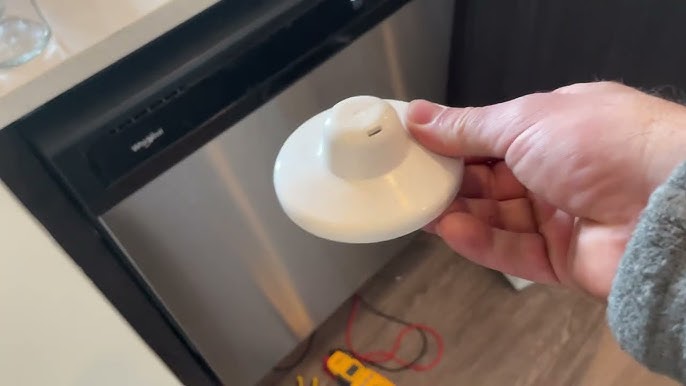Have you ever loaded your dishwasher, pressed start, and noticed it’s humming but not getting any water? You’re not alone.
This puzzling issue can leave you scratching your head, wondering what went wrong and how to fix it. Imagine the convenience of having your dishwasher work seamlessly, saving you time and effort. But when things don’t go as planned, frustration kicks in.
You want solutions, and you want them now. Understanding why your dishwasher hums but doesn’t get water is the first step to restoring peace in your kitchen. Dive into this article to uncover the reasons behind this common problem and discover simple tips to get your dishwasher back on track. Your kitchen’s harmony awaits.

Credit: www.ortegasappliance.com
Common Causes Of A Humming Dishwasher
Discovering your dishwasher humming but not getting water can be puzzling. This often signals a malfunction within the appliance. Understanding the common causes can help diagnose and fix the issue efficiently. Let’s delve into the usual suspects behind a humming dishwasher.
Faulty Water Inlet Valve
A malfunctioning water inlet valve can disrupt water flow. This component controls water entry into the dishwasher. If it fails, the machine hums but doesn’t receive water. Check for any blockages or damage to the valve.
Clogged Filters
Filters play a crucial role in keeping water clean. Dirt and debris can clog these filters. When clogged, they restrict water flow. This causes the dishwasher to hum without filling with water. Regular cleaning can prevent this issue.
Malfunctioning Pump
The pump is vital for circulating water. A malfunctioning pump affects water distribution. It can cause a humming sound, indicating it’s struggling to operate. Inspect the pump for signs of wear or damage.
Diagnosing Water Supply Issues
Diagnosing water supply issues in your dishwasher can be like piecing together a puzzle. One moment it’s humming away, and the next, there’s no water. If you’re scratching your head trying to figure out why, you’re not alone. Many homeowners face this dilemma. Understanding what’s happening can save you time and money. You’ll be amazed at how simple fixes can turn your dishwasher’s hum into a full cycle wash.
Inspecting Water Supply Lines
Start by checking the water supply lines. These are the lifelines connecting your dishwasher to your home’s water source. Ensure they’re tightly connected and not kinked or twisted. A simple twist or bend can restrict water flow. If you’ve recently rearranged your kitchen, double-check that the lines haven’t been compromised.
Look for leaks or signs of wear and tear. A small leak can cause significant water pressure loss. If you find any issues, replacing worn-out hoses or tightening connections can often resolve the problem. Keep an eye out for rust or corrosion, as these can indicate deeper issues.
Checking Water Pressure
Water pressure is crucial for your dishwasher to operate effectively. Low water pressure may be the culprit behind your dishwasher’s humming silence. You can test your water pressure using a simple gauge, available at most hardware stores. If you notice it’s low, it might be time to call a plumber.
Consider the impact of other appliances running simultaneously. If your washing machine or shower is in use, it might affect your dishwasher’s water supply. You may need to adjust your usage patterns to ensure optimum water pressure.
Have you ever adjusted your main water valve? Sometimes, tweaking it can make a world of difference. But don’t overdo it; you want to avoid too much pressure, which can cause leaks.
Isn’t it fascinating how small adjustments can change everything? A humming dishwasher doesn’t have to be a mystery. By inspecting water supply lines and checking water pressure, you’re taking proactive steps to ensure your appliance runs smoothly. What other small changes could make a big impact in your kitchen?
Checking The Water Inlet Valve
A dishwasher humming without water might have a faulty water inlet valve. This valve controls water flow into the dishwasher. If it malfunctions, water won’t enter the machine. Knowing how to check this component is crucial. Let’s dive deeper into identifying and replacing a defective valve.
Signs Of A Defective Valve
A humming noise often signals a problem. Water doesn’t fill the dishwasher. It might indicate a valve issue. Another sign is the dishwasher not cleaning properly. Leaks around the valve area are also common. Low water pressure can hint at a valve problem.
Steps To Replace The Valve
First, unplug the dishwasher. Turn off the water supply. Locate the water inlet valve at the bottom. Unscrew the access panel. Disconnect the inlet valve’s wires. Remove the screws holding the valve. Replace it with a new valve. Secure the new valve in place. Reconnect the wires and hoses. Reattach the access panel. Turn on the water supply. Plug in the dishwasher. Test the machine for proper function.

Credit: www.youtube.com
Examining The Filters And Screens
When your dishwasher hums but doesn’t get water, filters might be the issue. Filters and screens play a crucial role. They block debris from entering the system. Over time, they can get clogged. This restricts water flow. Examining them can solve your problem.
Locating Filters
Filters are usually at the bottom of the dishwasher. Remove the lower rack first. Look for a circular or rectangular cover. It is near the spray arm. Unscrew or unclip it carefully. This reveals the filter and screen beneath.
Cleaning Techniques
Detach the filter and screen gently. Rinse them under warm water. Use a soft brush to scrub away debris. Ensure all particles are removed. Soak stubborn grime in a mixture of vinegar and water. Rinse thoroughly before reattaching.
Pump And Motor Functionality
Understanding the pump and motor functionality of your dishwasher can be crucial when troubleshooting issues like a humming sound and lack of water. These components work together to ensure water flows efficiently and cleans your dishes. When something goes wrong, it can disrupt your daily routine and cause frustration. Imagine coming home after a long day, eager to relax, only to find your dishwasher isn’t working properly. Let’s dive into how you can test and fix this issue.
Testing The Motor
If your dishwasher hums but doesn’t get water, testing the motor is a logical first step. Start by disconnecting the dishwasher from the power supply. Safety first! Next, locate the motor, which is usually at the bottom of the unit. Check for visible signs of damage or obstruction. A motor that’s stuck or burned out can prevent water from flowing. You might need a multimeter to test for electrical continuity. It’s a handy tool that can confirm whether the motor is functioning. Have you ever felt the satisfaction of identifying a problem before calling a technician?
Repair Or Replacement Options
Once you’ve diagnosed the issue, consider whether repair or replacement is the best route. If the motor is simply stuck, a thorough cleaning might restore its functionality. However, if it’s burned out, replacement may be necessary. Research your dishwasher model to find compatible parts. It’s often more cost-effective to replace a faulty motor than to buy a new dishwasher. Have you weighed the pros and cons of DIY repair versus professional service? Sometimes, handling the repair yourself can save money and give you a sense of accomplishment. But never hesitate to call a professional if you’re unsure. Your dishwasher’s lifespan could depend on it!
Electrical Components And Wiring
Understanding the electrical components and wiring in a dishwasher is crucial. These elements ensure the appliance runs smoothly. A humming noise without water flow often points to electrical issues. Identifying the root cause can save time and prevent further damage. Let’s dive into the key areas to examine.
Checking Electrical Connections
Inspect the power cord for damage. Ensure it is securely plugged in. Check the circuit breaker box. Make sure the breaker for the dishwasher is not tripped. Examine the control panel for signs of malfunction. Loose connections can disrupt the power supply. Verify that all wires are attached properly. This prevents any interruptions in the electrical flow.
Identifying Faulty Wiring
Faulty wiring can cause the dishwasher to hum without working. Look for frayed or burnt wires. These can lead to power issues. Use a multimeter to test the continuity of the wires. This helps in identifying any breaks. Pay attention to any burnt smells near the wiring. This indicates overheating or short circuits. Address these issues promptly to avoid further damage.
Professional Help And When To Call
When your dishwasher hums and isn’t getting water, it can be a frustrating experience. You might be tempted to fix it yourself, but sometimes professional help is the best route. Understanding when to call a technician can save you time and prevent further damage. Let’s explore when it’s time to seek professional assistance and how to choose the right technician.
Signs For Professional Assistance
If your dishwasher hums continuously and fails to fill with water, it might be time for expert help. A persistent hum could indicate a problem with the motor or electrical components. If you’ve checked the water supply and cleaned the filters without success, a professional can diagnose and fix the issue efficiently.
Another sign is if water occasionally fills the dishwasher but then drains immediately. This might suggest a problem with the water inlet valve or float switch. Professional technicians have the tools and knowledge to pinpoint the exact cause.
Additionally, if you’ve noticed leaks or unusual noises besides the humming, it’s wise to call a technician. Such issues can worsen, leading to costly repairs or replacements.
Choosing The Right Technician
Selecting the right technician is crucial for a smooth repair process. Start by checking reviews online. Look for technicians with experience and positive feedback. Ask neighbors or friends for recommendations. Personal referrals can be invaluable.
Consider the technician’s certification and expertise. A certified professional often ensures quality service. They should be familiar with your dishwasher’s brand and model.
Lastly, inquire about warranty and service guarantees. A reputable technician should offer warranties on their repairs, giving you peace of mind. Check if they provide follow-up services in case the problem persists.
Have you ever faced a lingering appliance issue and wondered if a professional could’ve fixed it sooner? Sometimes, tackling problems early with the right help can prevent them from spiraling out of control.

Credit: fredsappliance.com
Frequently Asked Questions
Why Does My Dishwasher Hum But Not Fill With Water?
A hum often means the motor is running. Check water supply and inlet valve for issues.
What Causes A Dishwasher To Hum Without Water?
A faulty inlet valve or blocked water line can cause this issue. Inspect both.
How Do I Fix A Dishwasher That Hums?
First, check the water supply. Then, clean the inlet filter and valve.
Can A Blocked Filter Cause Dishwasher Humming?
Yes, a blocked filter can restrict water flow. Clean it to resolve the issue.
Is It Normal For A Dishwasher To Hum?
Some humming is normal. Constant humming without water is not. Check for blockages or faults.
Conclusion
A humming dishwasher can frustrate anyone. But understanding the issue helps. It often signals water supply problems. Check hoses and water valves first. Sometimes, debris clogs the inlet valve. Cleaning it might solve the issue. Regular maintenance prevents many problems.
Listen to your dishwasher’s sounds. They can tell you a lot. Simple checks save time and money. Ensuring proper water flow is key. Don’t ignore any unusual noises. Address them early for peace of mind. Your dishwasher will thank you.
Now, enjoy quieter, efficient dishwashing every time.
